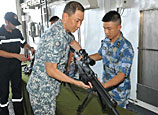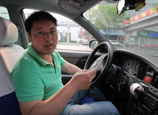
Shanghai is likely to introduce the country's first suspended monorail train by 2015 to improve the city's worsening traffic congestion and pollution levels.
Suburban Jiading district, as well as Changning district, which houses Shanghai Hongqiao International Airport, are among the many prospective bidders to clinch the first deal with Air Train International, the manufacturer of the floating train system, according to its chairman Chen Changgui.
An official surnamed Liu with the information office of Changning district confirmed the company is in talks with the Hongqiao central business district in west Shanghai.
Many local governments are considering having the project installed, in a bid to contain growing traffic jams and bridge remote neighborhoods with the nearest public transportation facilities, Chen said during the first China (Shanghai) International Technology Fair, which kicked off on Wednesday.
Apart from Shanghai, authorities from Tianjin and Luoyang, Henan province, are also serious about the plan to mitigate transportation tie-ups.
"We are poised to have our first installation completed by 2015, and it's most likely to happen in Shanghai," Chen said.
The floating trains, known as H-Bahn in German, are driverless passenger cars which are monitored from a control center. A movement inspector oversees the vehicle's position and status at all times.
The first track connecting two campuses of Dortmund University in Germany has carried 5,000 passengers on a daily basis. Not a single accident has occurred since its maiden tour in 1984, according to the company website.
The system can now determine the train's location with much higher precision - within 3 centimeters - so that trains may run on a higher frequency and follow each other more closely.
Air Train International uses signaling control technology developed by German conglomerate Siemens. But the Chinese firm has the capability to manufacture 95 percent of key components.
Train speed is up to 50 km/h, and it can handle 15,000 passengers per hour.
With an ideal operating distance of less than 15 kilometers, Chen said the system is best positioned to blanket densely populated office buildings, where demands to reach the nearest subway stations are huge.
The new facility edges out alternative means of transportation in cost efficiency, Chen noted. It takes about 150 million yuan ($24.4 million) to build 1 kilometer of suspended monorail, which is about one quarter of the cost needed to build the same length of subway.
It takes just one week to construct 3 kilometers of the line. What's more, the technology is powered by electricity and a full-speed train is similar in loudness to a human voice.
Wang Mengshu, deputy chief engineer of the China Railway Tunnel Group and a member of the Chinese Academy of Engineering, said the "floating train" serves as a perfect supplement to public transportation, notably in a city's busy area.
"It should be used as a part of the development of urban rail systems, in particular it should be used in combination with different modes of transport systems, say, big neighborhoods, airports and tourism attractions."
Wang said the system is usually about 9 meters above the road, detachable and with high transport capacity, which can carry about 10,000 people in one hour, at a speed of 30 to 50 km/h.
The German imported technology is considered safe, and has been used in cities in Germany and Japan, he added.
Feng Xingyun, a strong proponent of the system and a political adviser, said that the train works in all weather and does not disturb people's lives.
"In addition, it does not require much room and construction can be finished quickly. Most important, its routes can be adjusted to meet the need of city development.
AT A GLANCE
? China's technology trade volume surged from $3.56 billion in 1978 to $73.6 billion in 2012.
? China's technology imports reached $44.2 billion in 2012. The figure is expected to hit $100 billion by 2020.
? From 2002 to 2012, China imported 97,000 advanced technologies with a total value of $262 billion, while it exported 175,000 technologies worth $79.5 billion.
? Shanghai accounted for more than 40 percent of China's technology trade.
? China's authorized patent of invention amounted to 217,000 in 2012.


















![]()
